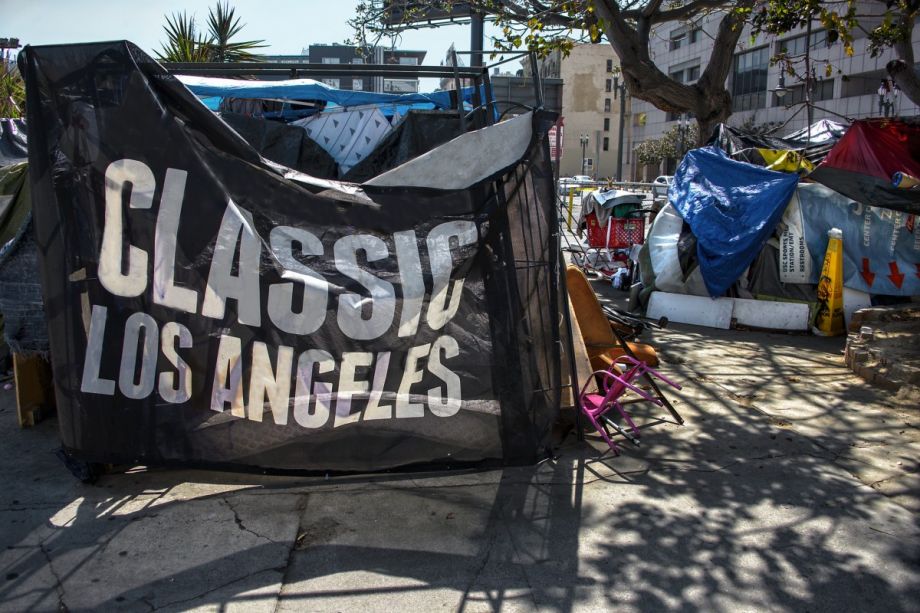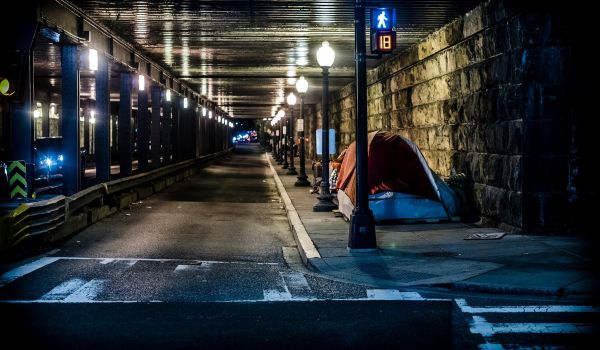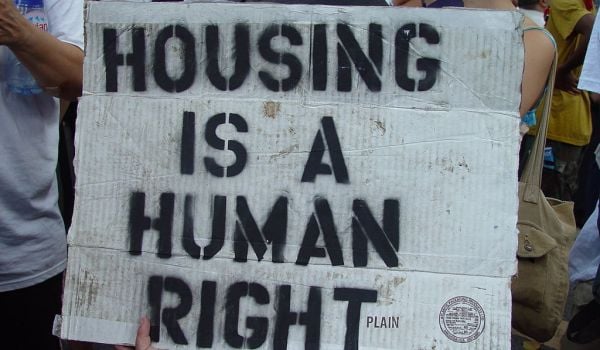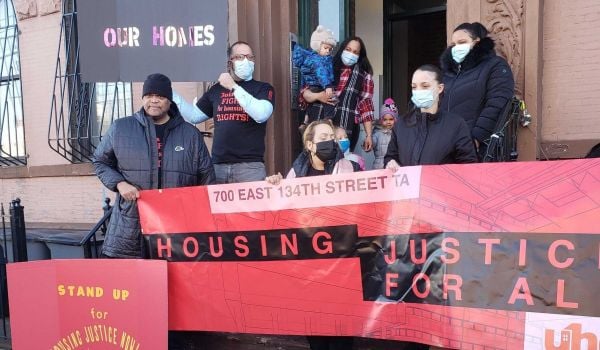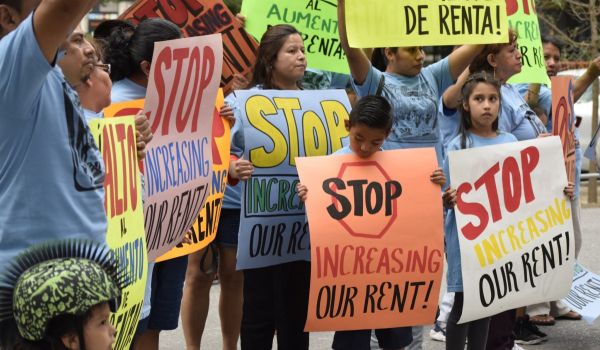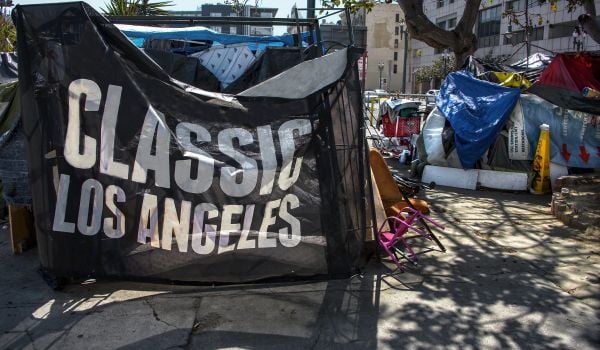Los Angeles Settlement Requires City to Spend Up to $3 Billion on Homelessness Over Five Years
A new settlement forces the city of Los Angeles to significantly increase the number of shelter beds. The expansion will increase the city’s spending on homelessness to $2.4 to $3 billion over five years, counting units already in production. NBC reports that the money would pay for up to 16,000 beds over the next five years, while more than 41,000 people currently live on the streets. The settlement stems from a complaint filed in 2020 by an organization called “LA Alliance for Human Rights.” Despite its name, the organization has frequently vilified unhoused residents and blamed them for street violence.
According to the organization’s website, it calls for an expansion of shelter beds as well as bans on street homelessness, which the group states is “removing those who exist to prey on those vulnerable and the communities in which they reside.” The group’s legal complaint places some of the blame for unsheltered homelessness on advocates and accuses them of putting “pressure on the City and County for years to permit public camping, allow the accumulation of piles of personal property on the streets, and generally make it more comfortable for people to live on the streets.”
The group prefers congregate shelter beds and large-scale congregate tents because they are cheaper than supportive housing beds LA has funded through Prop HHH, a ballot initiative intended to fund supportive housing. That initiative — funded through a $1.2 billion bond — has provided only a fraction of the promised housing units, with only 1204 units in service, according to Mayor Garcetti’s office. On average, each unit cost $583,201, with $131,490 per unit funded through the bond. The effort has been hampered by Trump-era changes to the federal tax code that make it harder to fund projects with affordable housing tax credits, according to KCRW.
The legal settlement requires the city to produce enough beds to shelter 60 percent of unhoused residents in each city council district. The exact number of beds needed to reach that number will be decided after the results of January’s homeless count are released in the spring, the LA Times reports. A 2020 count found 41,000 LA residents were unhoused, with 70 percent unsheltered. The settlement still needs to be approved by the city council. LA has been dealing with the homelessness crisis by implementing camping bans and shuttling residents around temporary shelters. “I have grave concerns that this settlement will propel the city even faster in the direction it’s been heading — moving some people into shelters, where they will most likely be locked into homelessness for years instead of being housed, and then using law enforcement to push everyone else from block to block,” Councilmember Mike Bonin said in a statement.
Portland Extends Its Housing Emergency for Three Years
Portland’s City Council voted to extend the housing emergency until 2025, the Portland Mercury reports. The emergency declaration lets the city loosen zoning and speeds up the bureaucracy for permitting and building homeless shelters and affordable housing. It also establishes storage facilities where unhoused residents can put their belongings. In 2021, the city passed an ordinance that would have done much the same thing as the housing emergency, and went a step further by legalizing tiny home villages and allowing people to live in RVs on residential property. But that policy can not be fully implemented until city agencies hammer out the details, hence the ongoing emergency declaration.
After interviewing 42 residents of tiny house villages, Portland State University researchers released a two-year study this week, which found that 86% were satisfied with their tiny home but problems remain. The villages were mostly serving white men despite the fact that 40 percent of Portland’s homeless residents are non-white. On the other hand, researchers found concerns from neighbors abated over time and property values did not decline in the area as some homeowners feared. The researchers told SouthwestConnection that self-governance gives residents a sense of ownership over their tiny home villages. They also cautioned that villages are an alternative to shelters but will not end homelessness. “Giving villagers a voice and sense of agency over how villages operate had a huge impact on villager satisfaction,” lead researcher Todd Ferry told SouthwestConnection.
NYC Eviction Crisis Ramps Up, Complicating Right to Counsel
A flood of delayed eviction cases is overwhelming housing attorneys who contract with the city to provide free legal representation to people who can’t afford it. The state’s eviction moratorium ended on January 15, and in that time, judges at the New York State Office of Court Administration have been unwilling to delay the scheduling of backlogged eviction cases. According to a press release from Legal Aid, Legal Services NYC, and New York Legal Assistance Group, attorneys with Legal Aid will no longer be able to take on new clients in Queens for the month of April. Gothamist reports that this is also the case in Brooklyn, and 475 cases proceeded without cases in The Bronx since March. Some electeds are now calling on Governor Hochul to help by enacting an executive order that will force state-run OCA judges to delay hearings until every tenant can be represented by a lawyer. According to the NY Daily News, there were more than 6000 new eviction cases in February and 7000 in March. While that number is still far below the monthly eviction filings before the pandemic, they are added to more than 200,000 eviction lawsuits that were delayed due to the pandemic moratorium that expired in January.
Right To Counsel was established in NYC in 2017 in select zip codes and was available only to lower-income renters in eviction proceedings, but was expanded citywide last year to tenants making 200 percent of the area median income. Prior to the program, only 1 percent of tenants in eviction proceedings had lawyers in housing court, compared with 71 percent after the program was rolled out. The program has successfully decreased the amount of frivolous eviction filings from landlords, but the outpouring of delayed evictions means the program will not be able to achieve its mandate of representing anyone who can’t afford it.
Seattle Advocates Begin Ballot Initiative for Social Housing
According to The Seattle Times, a ballot initiative in Seattle seeks to establish a new city housing authority that would focus entirely on creating, owning and maintaining social housing. Social housing is government or nonprofit-owned housing under community control that is permanently affordable. The initiative did not specify the cost and funding for the proposal. The campaign, led by an organization called House Our Neighbors, needs to collect 27,000 signatures to qualify for the ballot.
This article is part of Backyard, a newsletter exploring scalable solutions to make housing fairer, more affordable and more environmentally sustainable. Subscribe to our weekly Backyard newsletter.

Roshan Abraham is Next City's housing correspondent and a former Equitable Cities fellow. He is based in Queens. Follow him on Twitter at @roshantone.



